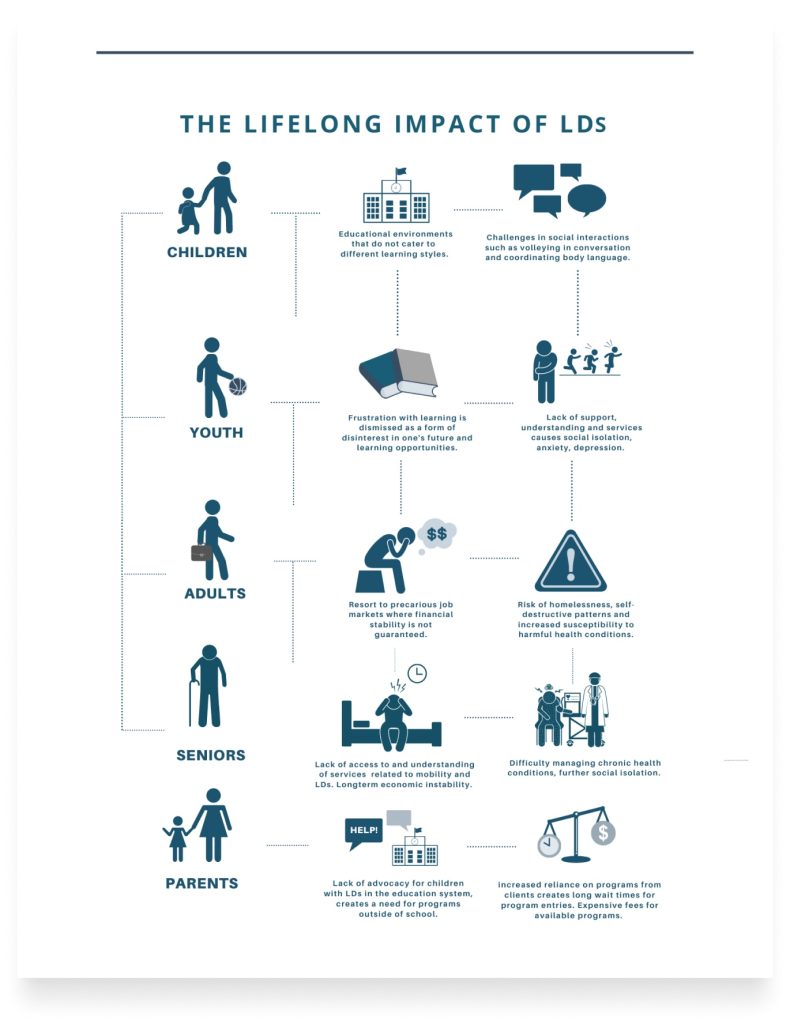
What are LDs

LDAO Definition
According to the Learning Disabilities Association of Ontario (LDAO), “learning disabilities” refer to a variety of disorders that affect the acquisition, retention, understanding, organization or use of verbal and/or non-verbal information. These disorders result from impairments in one or more psychological processes related to learning (a), in combination with otherwise average abilities essential for thinking and reasoning. Learning disabilities are specific, not global impairments and as such are distinct from intellectual disabilities.
Learning disabilities are due to genetic, other congenital and/or acquired neuro-biological factors. They are not caused by factors such as cultural or language differences, inadequate or inappropriate instruction, socio-economic status or lack of motivation, although any one of these and other factors may compound the impact of learning disabilities. Frequently learning disabilities co-exist with other conditions, including attentional, behavioural and emotional disorders, sensory impairments or other medical conditions.
(a) The term “psychological processes” describes an evolving list of cognitive functions. To date, research has focused on functions such as phonological processing, memory and attention, processing speed, language processing, perceptual-motor processing, visual-spatial processing, executive functions; (e.g., planning, monitoring and metacognitive abilities).
The previous definition is supported by a background document entitled Operationalizing the New Definition of Learning Disabilities for Utilization within Ontario’s Educational System, LDAO.
LD Impacts
Learning disabilities range in severity and invariably interfere with the acquisition and use of one or more of the following important skills:
- oral language (e.g., listening, speaking, understanding).
- reading (e.g., decoding, comprehension).
- written language (e.g., spelling, written expression).
- mathematics (e.g., computation, problem solving).
- learning disabilities may also cause difficulties with organizational skills, social perception and social interaction.
The Lifelong Impact of LDs
Children
Educational environments that do not cater to different learning styles.
Challenges in social interactions such as volleying in conversation and coordinating body language.
Youth
Frustration with learning is dismissed as a form of disinterest in one’s future and learning opportunities.
Lack of support, understanding and services causes social isolation, anxiety, depression.
Adults
Resort to precarious job markets where financial stability is not guaranteed.
Risk of homelessness, self-destructive patterns and increased susceptibility to harmful health conditions.
Seniors
Resort to precarious job markets where financial stability is not guaranteed.
Risk of homelessness, self-destructive patterns and increased susceptibility to harmful health conditions.
Parents
Resort to precarious job markets where financial stability is not guaranteed.
Risk of homelessness, self-destructive patterns and increased susceptibility to harmful health conditions.


LD Success
Individuals with LDs can certainly achieve success in all realms. This can be achieved through specialized interventions in home, school, community and workplace settings, appropriate to their individual strengths and needs, including:
- specific skill instruction;
- the development of compensatory strategies.
- the development of self-advocacy skills.
- appropriate accommodations.
LDATD offers a variety of programs and supportive services for children and youth, adults and newcomers. For more information on programs, support groups and services, click through our “Programs” menu options.



